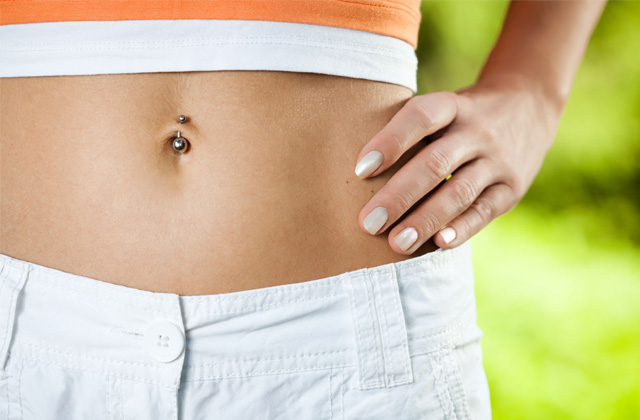Body piercings, especially belly button piercings have apparently become a new trend among the teenagers. But when it comes to parents, not each one of them agrees to this demand of their teen. The reasons are pretty simple here, the topmost being the discipline one needs to have to take care of navel piercing. For those parents who agree to this demand often come up with a number of questions. For instance, will their teen be able to take care of it, will they be able to suffer the pain and most importantly if it is safe. We will discuss all these aspects in this article below:
Read More: belly button during pregnancy
All You Need to Know About Belly Button Piercing in Teens
Age restriction
Well, some places do not allow for body piercing in case you are under the age of 18. You will need a parent’s permission and, in some cases, they may also require your parent to be present during the piercing. In fact, there are some states that do not allow minors to get piercings.
Medical History
Another important aspect is immunizations. You must ensure that you have had all your immunizations before you take a step to get the piercing. Hepatitis B and tetanus shots are a must. In case, you have a medical problem like allergies, diabetes, bleeding problem, a weekend immune system or congenital heart disease, you must consult your doctor. Do not get body piercings if you get keloids, which is an overgrowth of scar tissue.
The body is still growing when you are a teenager and as the teenager grows in height, the navel piercing jewellery is likely to migrate out of the body which will leave a permanent scar thereon.
More importantly, ensure that the career you are planning to pursue does not have any restrictions for those with navel piercings, as some piercing may affect your chances of getting a job.
Read More: 11 Effective Ways to Relieve Belly Button Pain During Pregnancy
Safety measures to get a belly button piercing:
Before you get a belly button piercing, you must do a little research to find out about the shop’s procedures and must ensure if it provides a safe and clean environment.
- The shop must have an autoclave, i.e. a sterilizing machine. They must sterilize instruments in sealed packets until they are used.
- Make sure that the piercer is a licensed practitioner.
- Make sure that he/she wears fresh disposable gloves and washes his/her hands before and after each procedure.
- More importantly, the practitioner should use ‘single-use needles’ and sterilized instruments.
- Before getting a navel piercing, make sure that you are not allergic to any of the metals and make a choice among the jewellery that are not likely to cause any reactions. For instance, surgical stainless steel, titanium, solid gold (not gold-filled or gold-plated), niobium etc.
After care tips
Belly button piercing may take up to six months to a year to heal. But there are some healing and after care tips that you must follow in order to take care of your belly button piercing:
- Wash the piercing and jewellery once a day, using mild soap and warm water.
- In order to avoid bacterial infections, do not touch the piercing with hands, mouth and fingers during and after the healing period.
- Place a bandage over the piercing making sure that it is water resistant, in case you go to swim in lakes, oceans or ponds etc.
- Do not change the piercing till the time the swelling reduces and is completely absent from the piercing.
- Wear loose clothing so that it does not touch the piercing or jewellery when you are sitting or standing.
- Place a vented eye patch over the piercing and also clip an ace bandage around the torso, if you participating in sports.
- Do not sleep on your stomach as this will put too much pressure eon your stomach. thus, sleep either on your back or sides.
Read More: Pregnant Belly: Does it Reveal if it’s a Boy or a Girl?
When can you change the belly button piercing?
It is recommended that you wait for approximately four months before you decide to remove or change your belly button piercing. This also depends on the healing, which, means if you do not take proper care of the piercing, it may take you even longer than 4 months.
You can try to move the jewellery and slid it a bit and if it hurts or becomes sore, it is better you wait for some more time before you change it.
What if it leads to any complications?
It is pretty common to have some redness, discharge and swelling after you get the belly button piercing. This does not really lead to any complications for most of the teens. But how would you know if this is a sign of an infection?
Well, if you feel that the area feels much hotter as compared to the surrounding skin and the redness does not go away, it’s the time you must consult your doctor. you may also see a discharge that smells bad and a growing amount of pus out there. Delaying the treatment procedure might leave you with a permanent scar on your body so it is advised that you seek immediate medical help.
Conclusion
Belly button piercings are generally considered safe for teen if they are done by a professional and a licensed practitioner. Most importantly, the safety largely depends on the care you take of the piercing. In case the piercing gets caught on your clothing, it may lead to an infection. So, you must be careful throughout the healing process.
Read More: Week 22 of Pregnancy – Pregnancy Week By Week
